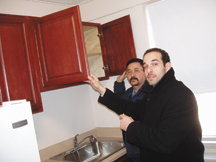It took over two years for the Hoboken Housing Authority (HHA) to spend $2.78 million in federal stimulus funding, but for those who can now move into 37 newly renovated units, it was perfect timing.
From the stucco-painted roofs to the freshly finished floors, the units are gleaming and ready to be leased out.
The HHA oversees more than 1,300 federally subsidized public housing units on the west side of town.
HHA Executive Director Carmelo Garcia said he hopes to have 18 new residents in the renovated units by the end of the month. Each unit cost roughly $10,000 to repair, which includes some apartments that received new stoves or refrigerators.
“100 percent of the money is being invested into the buildings.” – Carmelo Garcia
________
The Housing Authority houses “low, very low, and extremely low income families,” Garcia said, but he doesn’t want his residents to think of it as housing of last resort.
“A lot of these tenants are going to be working-class families,” he said, noting that the HHA board approved a housing preference for working families last year. “Ninety-five percent of the families down here are good citizens,” he said.
For Garcia, it’s a matter of pride to see such a marked improvement from the dilapidated projects in Hoboken in which he was raised.
“The closets have doors,” he said with joy. “Before there was just a pole that you could hang some fabric on.”
The HHA is funded through the Federal Department of Housing and Urban Development (HUD).
Garcia said the HHA received the stimulus funding in 2008, but the tedious process of planning, documenting, and committing the money was lagging when he took over as director in May 2009.
Bettering the buildings
Over the past few years, HHA officials had dedicated much of their time and resources to improving exterior areas of their properties, leaving residents with moldy cabinets or peeling floors.
Residents frequently asked at monthly board meetings why money is being invested into landscaping and porch lighting.
“One hundred percent of the money is being invested into the buildings,” Garcia said. “I’ve heard the same complaints for over a decade.”
Garcia said the multi-pronged improvement project will be complete by July, and the improvements should also help the authority save money, by using energy-efficient lighting for instance.
The cracking façades have lead to moisture, mold, and a spike in heating costs; now the moisture won’t be able to seep in and utility costs should be reduced, Garcia said.
The roof replacement at Jackson Gardens – “decaying for five years,” Garcia said – will save costs in similar ways.
Other improvements hit closer to home for Garcia and the residents.
Old hose cabinets in the halls were used as storage by drug dealers and vagrants since he grew up there, Garcia said. New sprinkler systems have made the hoses obsolete, so he tore the hose cabinets out.
Elevator cars that previously had poor lighting, bad ventilation, and the unscrubbable smell of urine are now being cleaned, painted, and refinished.
Last week, while the Reporter was getting a walking tour of the projects, a mother riding in the elevator said she noticed the difference and thanked Garcia.
He kissed her on the cheek and said, “Look, the families are taking ownership. As a landlord, we’re taking care of them, but the only way I can have success is to have them take ownership.”
Timothy J. Carroll may be reached at tcarroll@hudsonreporter.com.
